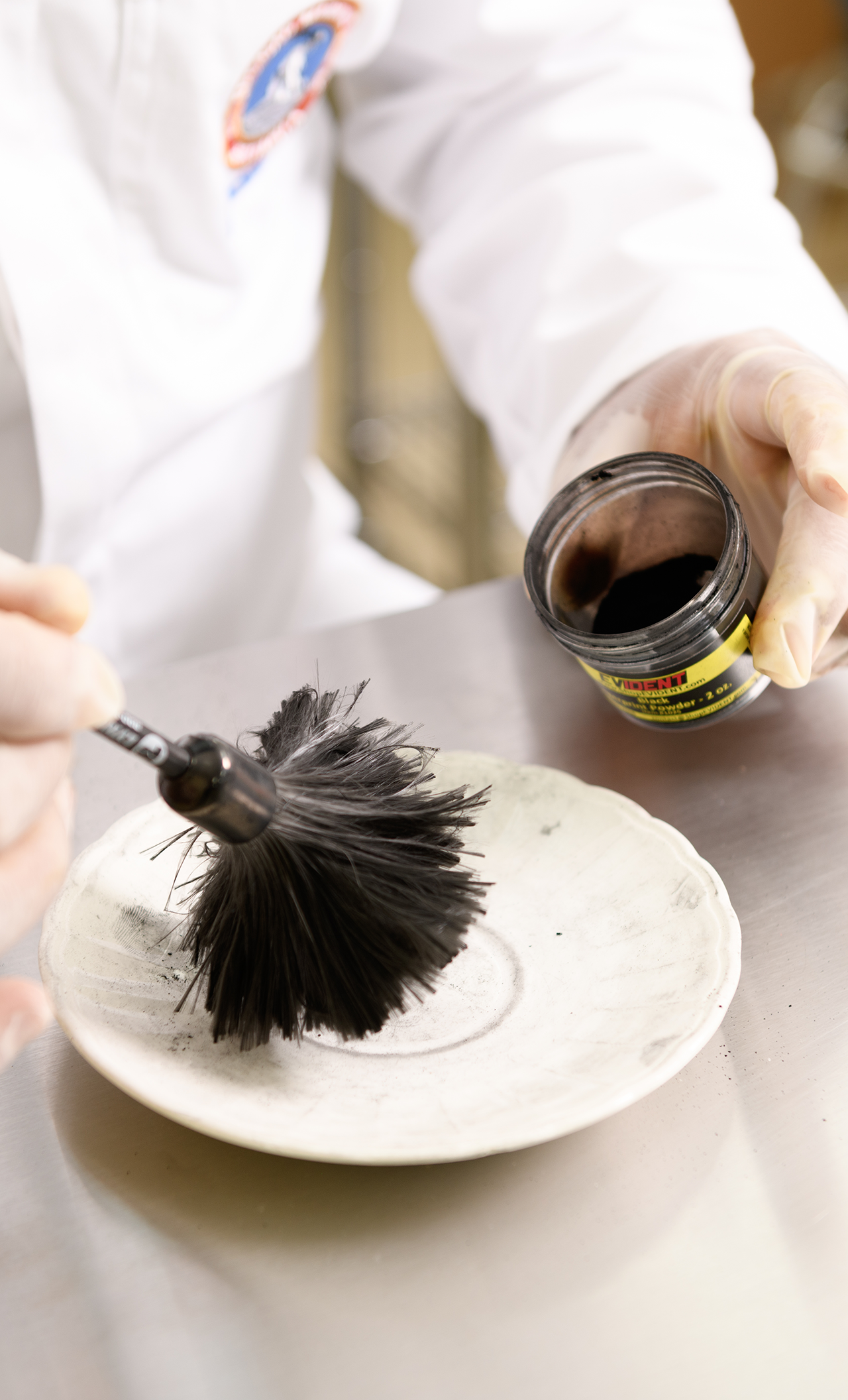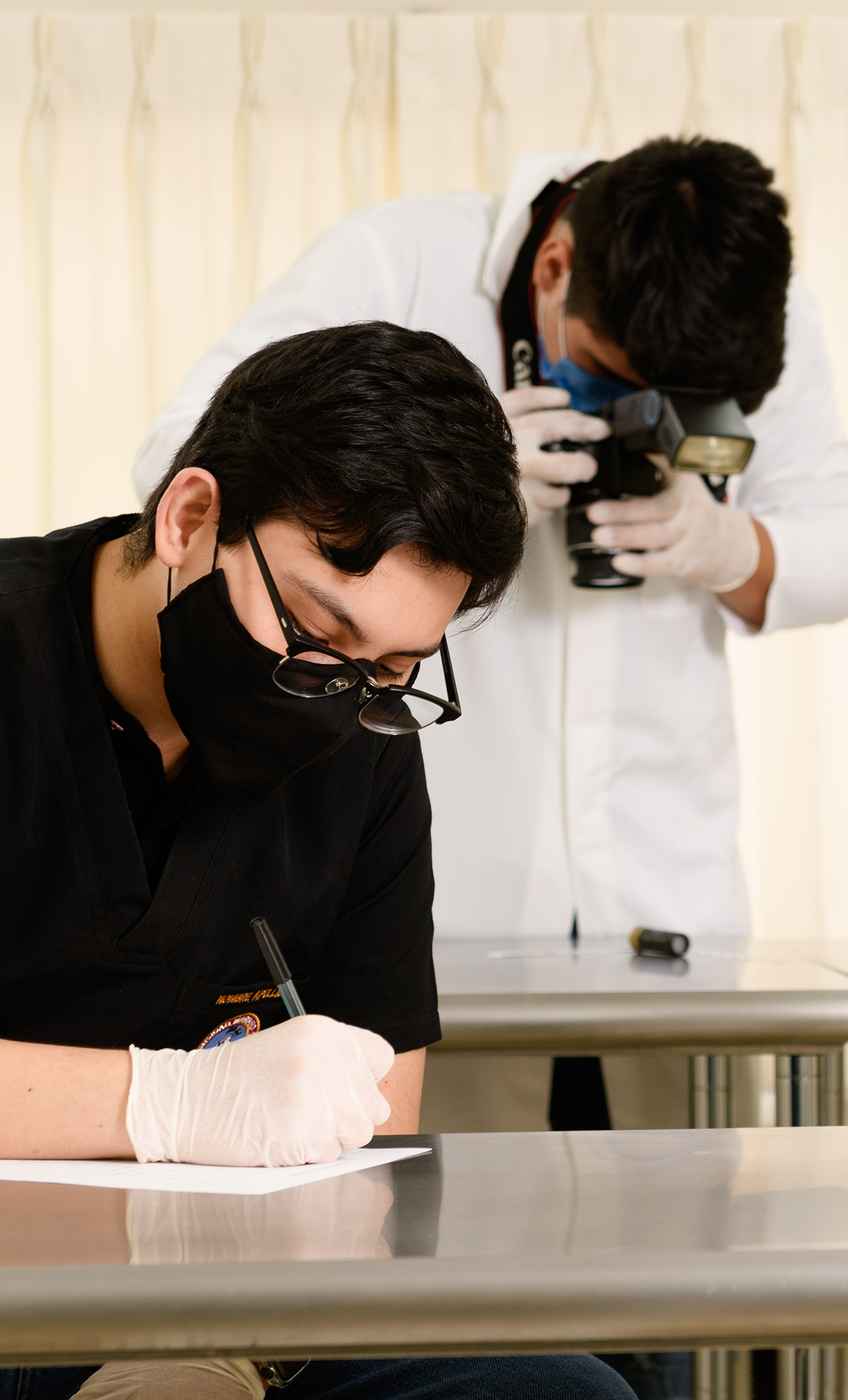
- Bachelor's Degree in
- Criminalistics and Forensic Sciences
- Degree to be obtained
- Bachelor's Degree in Criminalistics and ForensicSciences
- Academic degree
- Bachelor's Degree
- Duration
- 5 years
- Modality
- In-person
- Schedule:
- Daily Morning and afternoon sessions
- Career description
-
It is a career that promotes academic excellence by implementing of a comprehensive program for the training of technically and scientifically competent criminalists for crime scene analysis and evidence management.
The program covers forensic sciences with the support of specialised laboratories at the University.
Students will learn the importance of their role in the administration of justice.
- What will you learn during the program?
-
In this career, the student will be trained in theoretical and technical aspects to scientifically handle evidence and crime scenes, applying creativity, investigative skills and critical logic.
They will acquire knowledge in the biological, physical and chemical sciences and in human anatomy to search for clues to criminal acts.
They will learn legal aspects to ensure compliance of the legal framework in the actions carried out as a forensic experts, in the investigation of criminal acts.
Gallery
AdmissionProfile
To enter the Universidad Mariano Gálvez de Guatemala, applicants must meet formal requirements such as having a high school diploma and all the certificates that accredit it, they must pass a placement test in which they determine their basic knowledge of writing, reading, spelling, numerical and logical ability, among other aspects. In terms of personality, an interdisciplinary team evaluates aspects such as emotional development, character, development and above all principles and values. Students must adhere to the specific admission requirements established by the University, which are:
1) Passed placement test.
2) To have the original general certification middle and high school education.
3) The original certificate of completion
4) Photostat of the degree in size 5” X 7”.
5). Two passport-size photos.
6) Photocopy of DPI (if a minor, photocopy of birth certificate).
7) Payment of registration fee.
Graduate'sProfile
Graduates will be up-to-date professionals with a command of the interdisciplinary knowledge of criminalistics and forensic sciences, they will be accustomed to carrying out a logical, critical, constructive, and proactive analysis of criminal cases and events, will have the ability to carry out an objective analysis of their environment to begin the search for the criminal's route, they will be able to work in multidisciplinary teams and be creative in order to incorporate scientific innovations into their careers.
Career Opportunities

The professionals of the School of Criminology and Criminalistic Sciences have a graduate profile rich in interdisciplinary training, they are highly qualified to work in institutions such as the Public Prosecutor's Office, Police and criminal investigation institutions.
Some of the positions in which professionals in this specialty develop are in the field of security and justice at a governmental level, having options in different institutions in which they provide elements of forensic sciences and facilitate research, consultancy, supervision of processes and of course, contribution to the clarification of criminal acts and other crimes.
Curriculum
| 1° Ciclo | CRIMINALÍSTICA | CRIMINOLOGÍA | DESARROLLO HUMANO Y PROFESIONAL | INTRODUCCIÓN AL DERECHO | SOCIOLOGÍA APLICADA |
|---|---|---|---|---|---|
| 2° Ciclo | CIENCIAS AFINES A LA CRIMINOLOGÍA | CIENCIAS FORENSES | ORATORIA FORENSE | POLÍTICA CRIMINAL | TEORÍA DEL DELITO |
| 3° Ciclo | APLICACIÓN DE LA CRIMINALÍSTICA | APLICACIÓN DE LA CRIMINOLOGÍA | BIOLOGÍA APLICADA | DERECHO PENAL | MATEMÁTICA |
| 4° Ciclo | BIOLOGÍA FORENSE | DERECHO PROCESAL PENAL | FOTOGRAFÍA, VIDEO Y PLANIMETRÍA FORENSE | LOFOSCOPÍA, PRINCIPIOS DE HOPLOLOGÍA | METODOLOGÍA DE LA INVESTIGACIÓN CIENTÍFICA |
| 5° Ciclo | ANATOMÍA HUMANA | DERECHO CONSTITUCIONAL | FÍSICA APLICADA | QUÍMICA APLICADA | TÉCNICAS DE INVESTIGACIÓN CRIMINAL |
| 6° Ciclo | DERECHO INTERNACIONAL PÚBLICO | FÍSICA FORENSE | INFORMÁTICA FORENSE Y EVIDENCIA DIGITAL | MEDICINA FORENSE | QUÍMICA FORENSE Y TOXICOLOGÍA |
| 7° Ciclo | ANÁLISIS INSTRUMENTAL | AUDITORÍA FORENSE | BALÍSTICA | INTRODUCCIÓN A LA ARQUEOLOGÍA Y ANTROPOLOGÍA FORENSE | LESIONES CORPORALES, ENFOQUE CLÍNICO Y TANATOLÓGICO |
| 8° Ciclo | APLICACIÓN INTERDISCIPLINARIA DEL CONOCIMIENTO FORENSE | APORTES FORENSES DEL ADN | DOCUMENTOSCOPÍA | GERENCIA Y ADMINISTRACIÓN | ODONTOLOGÍA FORENSE |
| 9° Ciclo | ELECTIVO NACIONAL O INTERNACIONAL |


